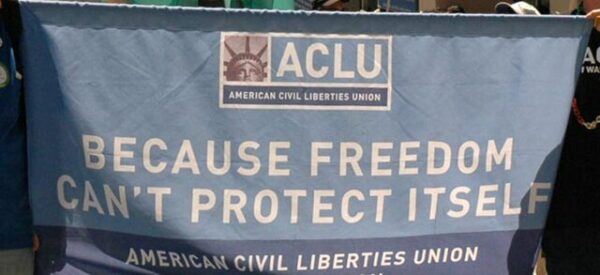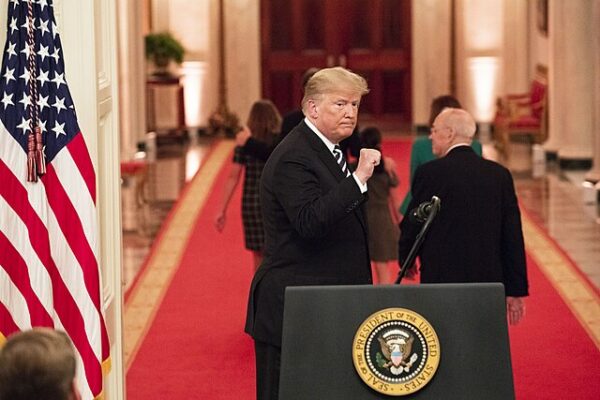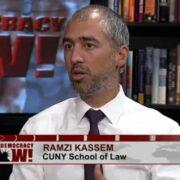
It only took a few hours for liberals to sue the Trump White House. The American Civil Liberties Union (ACLU) and a coalition of immigrant advocacy groups have filed a lawsuit against President Trump, challenging an executive order targeting birthright citizenship.
The contested executive order seeks to limit birthright citizenship for children born in the United States to parents living in the country unlawfully or on certain temporary visas.
The executive order stated that “The privilege of United States citizenship is a priceless and profound gift. The Fourteenth Amendment states: “All persons born or naturalized in the United States, and subject to the jurisdiction thereof, are citizens of the United States and of the State wherein they reside.” That provision rightly repudiated the Supreme Court of the United States’s shameful decision in Dred Scott v. Sandford, 60 U.S. (19 How.) 393 (1857), which misinterpreted the Constitution as permanently excluding people of African descent from eligibility for United States citizenship solely based on their race.
But the Fourteenth Amendment has never been interpreted to extend citizenship universally to everyone born within the United States. The Fourteenth Amendment has always excluded from birthright citizenship persons who were born in the United States but not “subject to the jurisdiction thereof.” Consistent with this understanding, the Congress has further specified through legislation that “a person born in the United States, and subject to the jurisdiction thereof” is a national and citizen of the United States at birth, 8 U.S.C. 1401, generally mirroring the Fourteenth Amendment’s text.
Among the categories of individuals born in the United States and not subject to the jurisdiction thereof, the privilege of United States citizenship does not automatically extend to persons born in the United States: (1) when that person’s mother was unlawfully present in the United States and the father was not a United States citizen or lawful permanent resident at the time of said person’s birth, or (2) when that person’s mother’s presence in the United States at the time of said person’s birth was lawful but temporary (such as, but not limited to, visiting the United States under the auspices of the Visa Waiver Program or visiting on a student, work, or tourist visa) and the father was not a United States citizen or lawful permanent resident at the time of said person’s birth.
The lawsuits, which include organizations like New Hampshire Indonesian Community Support, the League of United Latin American Citizens, and Make the Road New York, argue that the measure violates the Constitution and contradicts fundamental American principles. ACLU Executive Director Anthony Romero called the denial of citizenship to U.S.-born children unconstitutional, labeling it a repudiation of American values. He emphasized that birthright citizenship is integral to the strength and dynamism of the United States.
Central to the lawsuit is the interpretation of the 14th Amendment, which states that all persons born or naturalized in the United States and subject to its jurisdiction are citizens. The meaning of “subject to the jurisdiction thereof” has been debated for decades. In the landmark 1898 Supreme Court case Wong Kim Ark v. United States, birthright citizenship was affirmed as a constitutional right, but dissenting opinions from that time still influence contemporary legal disputes.
Supporters of Trump’s executive order argue that the 14th Amendment does not automatically grant citizenship to children born in the U.S. unless at least one parent is a lawful permanent resident or citizen. Christopher Hajec, from the Immigration Reform Law Institute, told The Daily Caller that he believes that extending citizenship to children of undocumented immigrants or temporary visitors misinterprets the Constitution. He argued that the amendment applies only to those born to parents residing in the U.S. with government permission.
Trump’s push to address what he considers abuses of birthright citizenship has garnered strong support from immigration hardliners. Critics, however, view these efforts as part of a larger strategy to restrict immigration and reinterpret long-established constitutional rights.
The lawsuit is expected to reach the Supreme Court, intensifying an already divisive national conversation about immigration and constitutional law. The ACLU, which initiated hundreds of legal challenges against Trump during his first term, remains confident in its case.
The pro-immigration groups were joined by 18 states, as well, noted The New York Times. “Attorneys general from 18 states sued President Trump on Tuesday to block an executive order that refuses to recognize the U.S.-born children of unauthorized immigrants as citizens, the opening salvo in what promises to be a long legal battle over the Trump administration’s immigration policies.
The states view Mr. Trump’s attempt to limit birthright citizenship as ‘extraordinary and extreme,’ said New Jersey Attorney General Matthew J. Platkin, who led the legal effort along with the attorneys general from California and Massachusetts. ‘Presidents are powerful, but he is not a king. He cannot rewrite the Constitution with a stroke of the pen.’”
The same Democrats seemed less concerned by Joe Biden’s deeming the existence of a 28th Amendment via tweet last week. As one of his final acts as president, Biden and Vice President Kamala Harris declared on Friday that the Equal Rights Amendment (ERA) is “the law of the land.”
The Washington Free Beacon explained that the ERA is, in fact, not “the law of the land,” writing that “Biden and Harris do not have the authority to approve constitutional amendments, their statements carry no legal weight, and the U.S. archivist tasked with certifying the amendment has repeatedly determined the ERA was not legally ratified.”
[Read More: Trump Strips Famous Republican Of Security Clearance]











